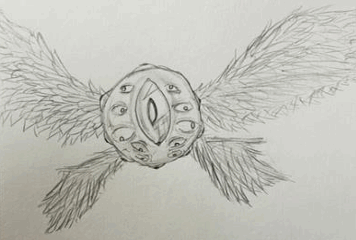The Gospel of all Creatures
A reflection by Trevor Bechtel on April 27, 2025
Let me start today by asking you what your favorite scripture passage is.
I won’t ask you to share it with the group, but think of one.
Did any of you choose the whole bible?
This dynamic, between the Bible as a holy book and having favorites is the thing that I want to spend some time talking about this morning. It is probably no where as clear as in Mark 16.9-20, today’s scripture. I’ll also make some connections to how the 16th century Anabaptists developed a whole theology from verse 15.
Max talked some about this passage last week, about how there are multiple endings to the book of Mark, and our scripture for today is this longer ending that we are pretty sure wasn’t a part of the original book. In fact we are so sure it is not original that it often shows up with brackets around it in most bibles.
It’s not original but it is still some people’s favorite passage. It’s not my favorite passage, that’s the first few chapters of Ezekiel, but it’s definitely in my top 10. And it’s probably my favorite text in terms of its reception history.
Reception history is a scholarly term but it’s one that is exactly what it says it is. It’s the history of how people have received the biblical text. This includes how they have read the text, how they have interpreted it, and how the meanings that people have made of the text have then shaped other people’s interpretations.
This is an important idea if we want to understand what other people understand the Bible to be about. This is true for other people living now, but also for people who lived a century ago, or 500 years ago or 50 years after Jesus died.
Maybe the most famous example of reception history regards readings of Genesis 1. Exactly 100 years ago there was a famous court case, the Scopes trial, in which a substitute teach was charged with violating the Butler Act which prohibited any teaching against the biblical account of creation. Without making any judgments about anything, you know that a text has a reception history when people write laws about what you can teach in relation to it. Laws typically only happen when people want to settle a disagreement that already exists.
So let me ask you another question. What is a biblical passage that you read differently now than at some earlier point in your life? What shaped your reception of that text? Each of us could probably write a very interesting reception history of our favorite texts. We could probably write even more interesting stories about our least favorite texts.
Mark 9-20 is almost surely the first example of a text being received in the New Testament, because that reception is also in the Bible. Mark 9-20 are a reaction to the original ending. Whoever wrote this part of the story wanted to give us more. Perhaps they just wanted to have Mark end more like the other gospels. Perhaps they wanted to emphasize the power of the resurrection. Perhaps they were just really into fan fiction.
Whatever the case may be they wrote a really incredible text.
Verses 17 and 18 read,
17And these signs will accompany those who believe: bin my name they will cast out demons; cthey will speak in new tongues; 18 they will pick up serpents with their hands; and if they drink any deadly poison, it will not hurt them; they will lay their hands on the sick, and they will recover.”
These two verses have created a whole movement inside Christianity in which some Christians believe that handling snakes is a sign of God’s power to control the uncontrollable. This reception adherents throughout Appalachia and a distinctive forms of worship in which snakes are a part of worship. The book Salvation on Sand Mountain give an empathetic account of these Christians.
We do not read the Bible that way, but we are still shaped by that reception. We are more leery of potentially harmful literal interpretations of scripture because we know about Snake Handling Churches.
The passage that I want to focus on for a bit this morning is verse 15 Go into all the world and uproclaim the gospel to vthe whole creation.
When Germans in the 15th and 16th century read this passage they saw it as revealing deep connections between the world of nature and the world of story. For them the Bible and the natural order told the same story, that of Christ crucified. They called this The Gospel of All Creatures.
Thomas Münzter was a important reformer and revolutionary who played an important role in the Peasant’s War, He talks about the Gospel of All Creatures this way,
I have not heard from a single scholar about the order of God implanted in all creatures, not the tiniest word about it;
One of his disciples as an early Anabaptist named Hans Hut. He says
“For all that can be shown in the scriptures is already shown in the creatures,”
“Christ had no need of scriptures unless he wanted to prove something from it to the soft scholars.”
When the “Gospel of all Creatures” is preached, a person is then brought to understanding in a reasonable and natural way. He sees it in his own work, that which he does in relation to the creatures.
Now you may be thinking hey wait Trevor. The passage from Mark says that we should preach the Gospel to All Creation and these passages are how Creation preaches the gospel better than scholars.
And I would say to you two things. One, yes there is some irony here and two, yes that is exactly what is going on. We know that the 16th century Anabaptists were against most aspects of the institutional church, and especially the priests. There is a lot of we already have everything we need energy in this reading.
Here’s Pilgram Marpeck writing several decades later about the same idea,
Yes, even if a dog or a cat were to proclaim the gospel as a testimony, throughout the unbelieving world and deliver it into repentance an improvement, who could declare it wrong? For everything that leads to godliness is good, and not evil, for all visible creatures are placed in the world as apostles and teachers (Job 12). If such mute creatures could speak, Christ’s sending the apostles to elucidate or preach the gospel would have been unnecessary.
Most of you know that this is my jam. When I first came across this idea it totally captivated me. In many ways it became one of my life’s central projects to figure out how dogs and cats were proclaiming the gospel as a testimony.
I love these passages, and I love what these thinkers are doing as they read the scripture about preaching to all creatures and take the meaning that because we are to preach to creation that creation must already be on the same page.
That when we are sent to preach to creation we are sent to people and animals who have something to teach us.
There is another emphasis to the Gospel of All Creatures that I’m less comfortable with, but that especially one Sunday after Easter I shouldn’t hide from you.
Here’s Thomas Muzter again,
“Holy Scripture shows nothing else—as all the creatures bear witness—than the crucified Son of God.”
And Hans Hut,
If one wants to use an animal, it must first be dealt with according to human will—it must be prepared, cooked and roasted. That is, the animal must suffer. And God does the same with human beings. If God has use of us or will have benefit of us, we must first be justified and made pure by Him, both inwardly and outwardly; inwardly from greed and lust, outwardly from injustice in our way of living and our misuse of the creatures.[vi]
I don’t like the inevitability of suffering even as the longer I live the more I recognize it to be true. I don’t like the analogy between the human use of animals for food and God’s use of humans for benefit. I don’t like the idea that I must be purified for God even as I recognize that inwardly and outwardly there is much that I can improve.
I don’t like the idea that I am sent to preach the gospel to all creation and that when I am sent to preach I am sent to people who have something to teach me and that the lesson might be that I am acting unjustly towards them. I don’t like this idea but I do recognize that there are things for which I need to seek repentance.
I wanted to talk to you about The Gospel of All Creatures today because it remains an important idea to me and in this 500th anniversary of Anabaptism I want to share some of my favorite parts of this tradition with you.
I also wanted to talk to you about it because it does all originate from this passage in Mark and so it’s a fitting epilogue to our series on Mark which ended last week.
But it’s also interesting to me and I hope to you that all of this comes from a passage that gets put into brackets in our bibles.
If we were purists about what we included and didn’t include in our bibles would we drop this passage?
Is it still scripture even though Mark didn’t write it?
One of my favorite things about the Bible is how it is a discussion inside itself. We see that here in a really obvious way because we have preserved an answer to Mark’s abrupt ending. But we can also see it between the New and Old Testaments, among the four gospels, between many of Paul’s letters, or between the different parts of the Hebrew Bible.
And the Bible show us that we are meant to continue this discussion with ourselves, with our history, and with the Bible itself, and of course with all creation.
I want to end with another shout out to the Anabaptist Bible of which we have several copies in a book shelf in the back of the Sanctuary. I moved them there to give a bit of Anabaptist representation in this space.
The most exciting thing about this Bible is that it brings the discussion the Bible is having with itself into the present day. There are three kinds of marginal notes in this Bible. Some are written by scholars, providing details about how scholarship has received these texts, some are quotations like the ones I read as a part of this sermon from 16th century Anabaptist authors and some are by groups of readers who were randomly assigned texts as part of a huge process over the last two years.
We at Shalom participated in this process reading passages from Isaiah, Galatians, and Proverbs.
Some of our notes are printed in this Bible, but some are not … even though there would have been space to include them. I also contributed some scholarly notes about the book of Nahum and Anabaptist quotes about the gospel of all creatures. For some reason all of my notes about Nahum were included, even though I know comparatively little about Nahum compared to other scholars. Very few of my Gospel of All Creatures notes, something I know comparatively much more about made it in.
I don’t know why but that brings me to a final note as we think about the Bible and how we receive it. That is that what we know or can see about the discussion that God is having with us is always much less that what is actually there.

